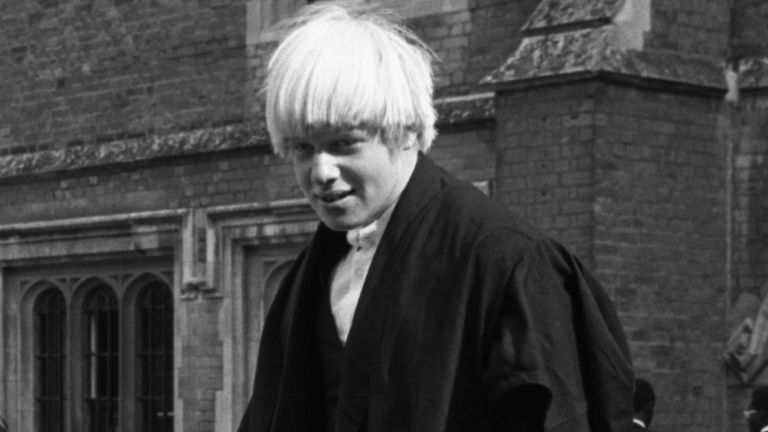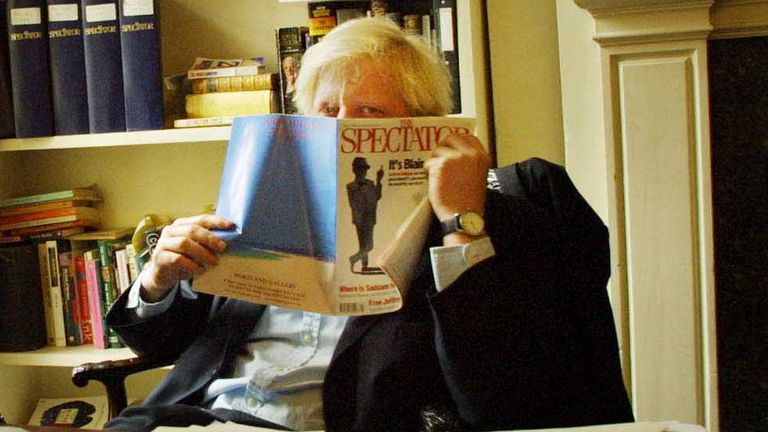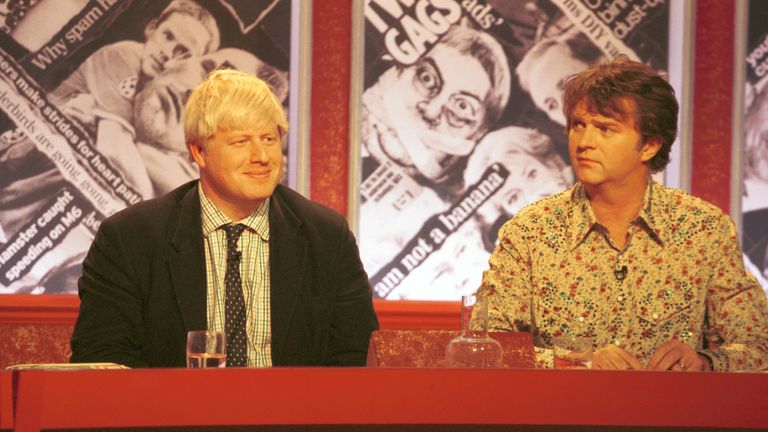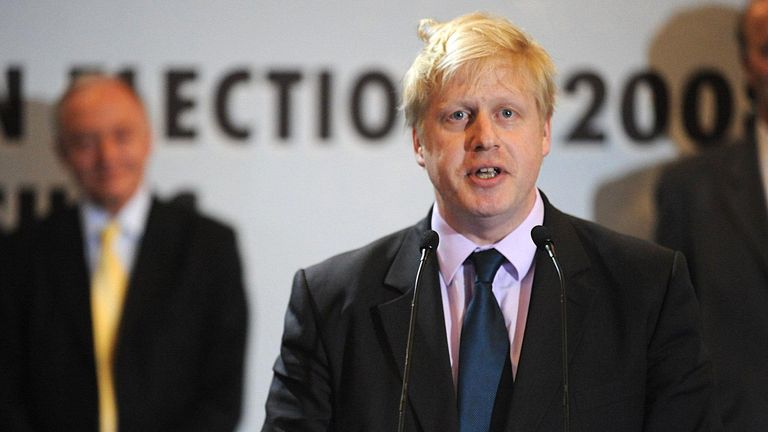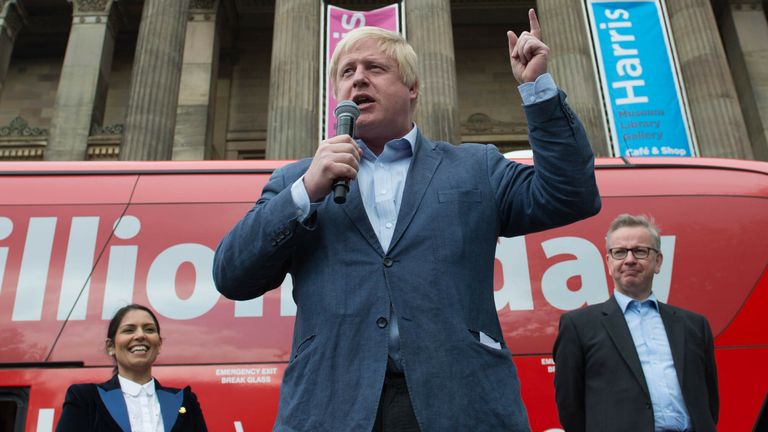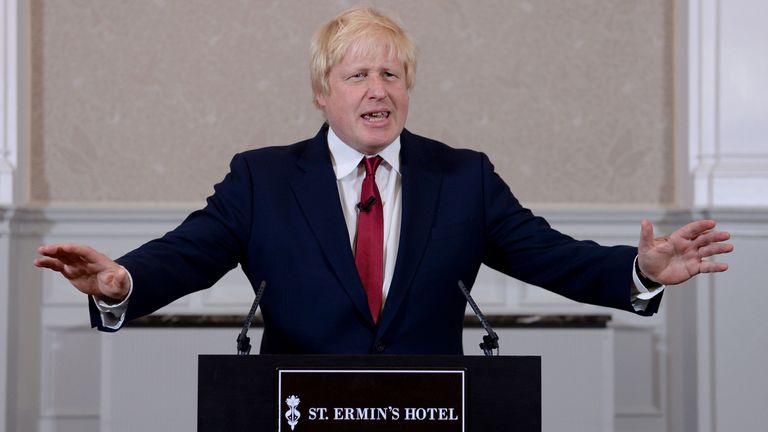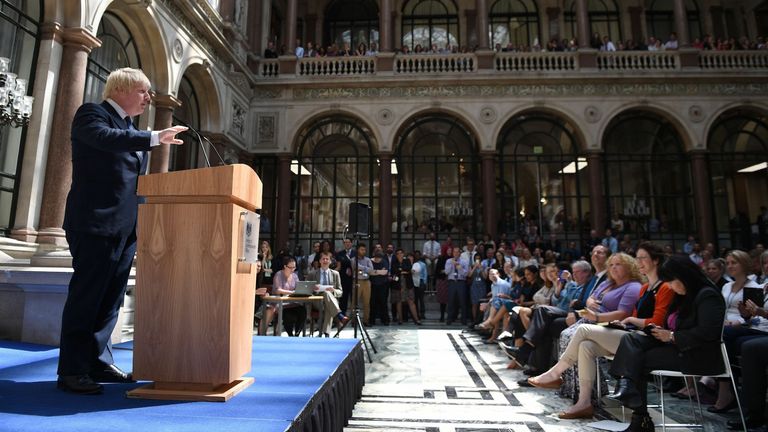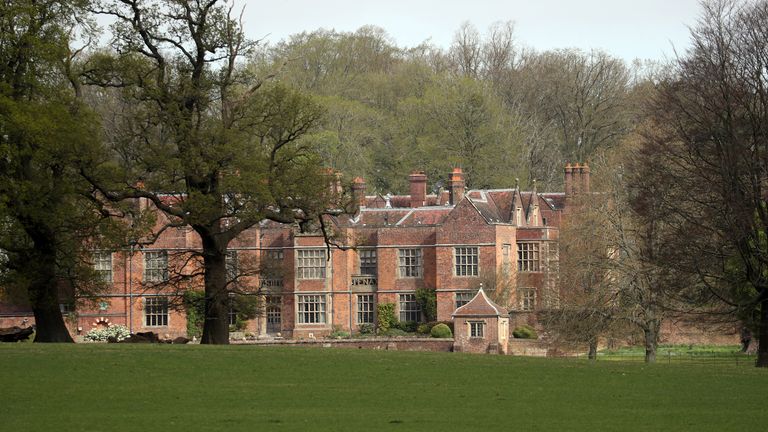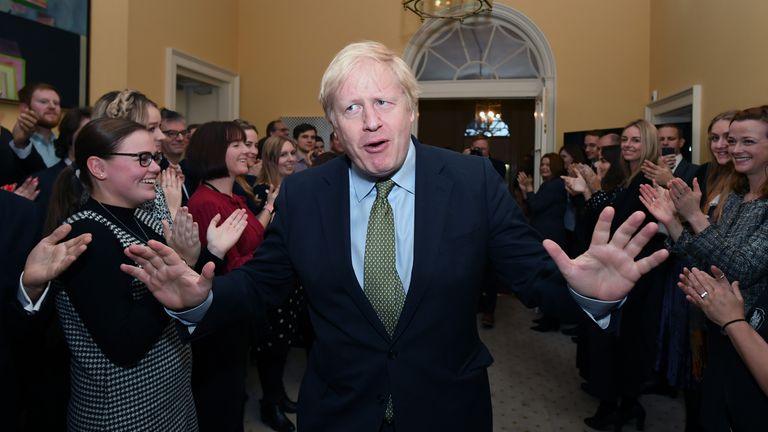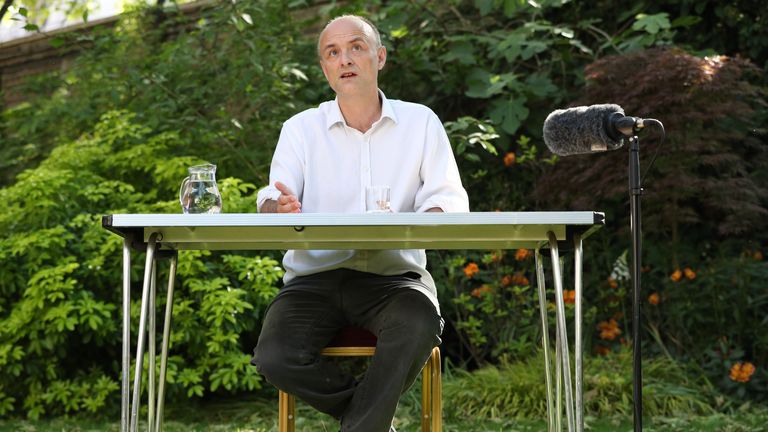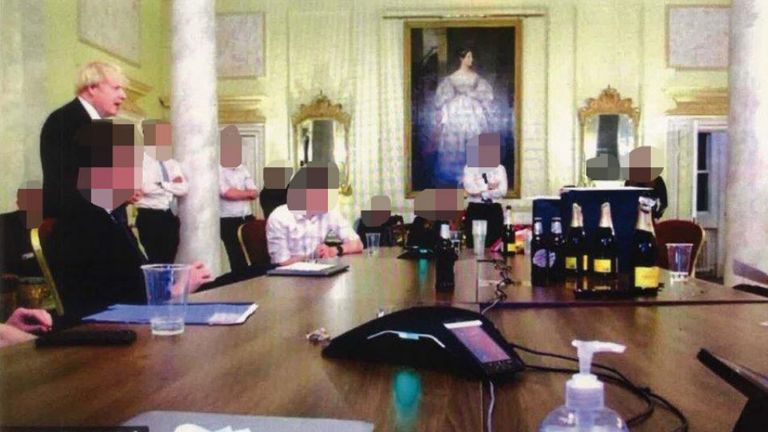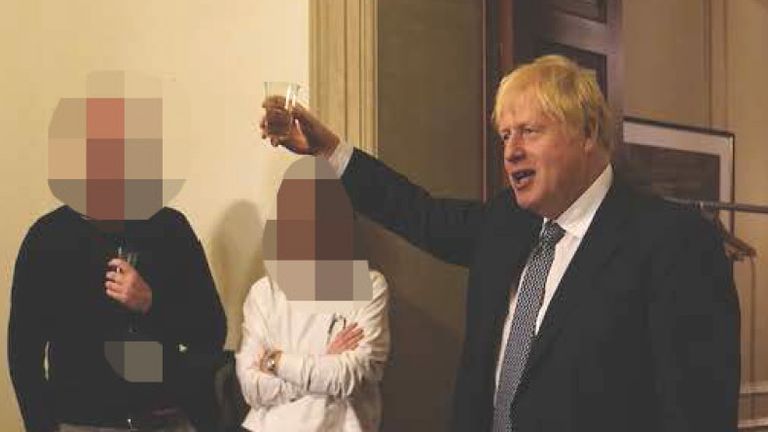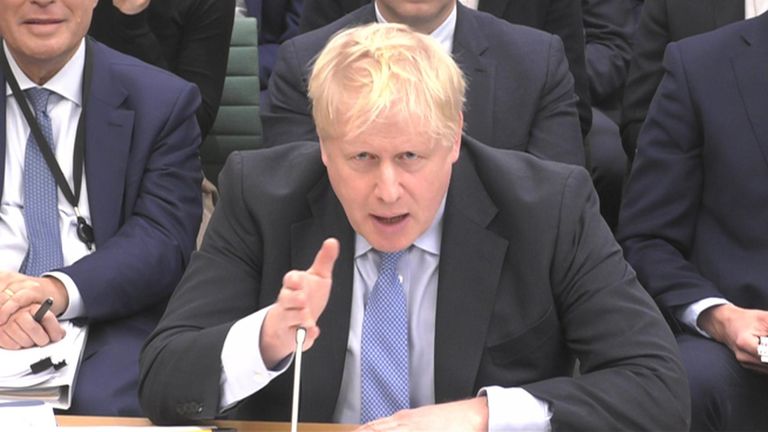Boris Johnson resigns as an MP – the bombastic political career that came to a bitter end | Politics News

After his landslide general election victory in 2019, Boris Johnson looked unassailable as prime minister.
His majority of 80 marked the end of the parliamentary logjam over Brexit, the Labour Party had collapsed into bouts of infighting and critics within his own party were silenced.
The Conservatives had elected him leader months earlier, not because he had demonstrated a particular aptitude for government in his previous roles, but because they thought he could win where others could not – and he delivered in emphatic style.
He had wooed voters in parts of the country where his party had never dreamt it possible to win.
The idea Mr Johnson could spend a decade or more in Downing Street was a real prospect.
But two and a half years on, it was all over.
A man whose career was defined by surviving scandal against the odds was brought down ingloriously.
When the moment came, his fall from power was as full of drama and controversy as his ascent.
And yet he did not leave parliament, and even in his Downing Street resignation speech, he left the possibility of a return hanging as a tantalizing prospect for his allies.
His decision to step down immediately as an MP seems to have extinguished that prospect.
But cast an eye over Boris Johnson’s political history, and few would ever say that with 100% certainty.
Read more:
Live updates and reaction
Johnson stands down as MP
What led to shock departure?
Resignation statement in full
World king
Born in New York in 1964, Alexander Boris de Pfeffel Johnson spent the first years of his life moving between countries with his family, as his father Stanley pursued a varied international career.
At the age of eight, it is said he declared his ambition was to become “world king”.
Schooled at Eton, he went on to Oxford University in 1983 to study Classics at Balliol College. He became president of the Oxford Union debating society, as well as a member of the notorious Bullingdon Club.
While in Oxford he met his first wife, Allegra Mostyn-Owen.
After graduating he began his career in journalism, joining The Times as a trainee before being sacked for making up a quote in a story.
At 25 he became The Daily Telegraph’s Brussels correspondent, making his name as a writer with articles questioning and ridiculing laws and directives from the European Commission.
There were tales of undersized condoms running afoul of European rules, wonky bananas and bans on prawn cocktail crisps.
Readers of the eurosceptic Telegraph lapped it up at a time when the governments of Margaret Thatcher and Sir John Major were grappling with the thorny issue of Europe.
His articles may have stretched the truth, but they have since been credited with revitalising the cause of euroscepticism.
Brussels contemporaries say this period also saw the “Boris act” in full flow.
Everything – including his clothes, car and flat – were a mess. But this persona disarmed his rivals, leaving them with their guards down.
“Boris was very clever at creating an image and downplaying expectations so that colleagues thought he was way off-beam, and didn’t know what he was doing,” The Times journalist Michael Binyon told Mr Johnson’s biographer Sonia Purnell.
“He put rivals off the scent and would then come up with a cracker of a story.”
During his time in Brussels he married his second wife, Marina Wheeler.
Finding fame
When he returned to London five years later, Mr Johnson became a regular Telegraph columnist and began writing for The Spectator.
He made a litany of offensive remarks in these columns that would attract scrutiny as he embarked on a political career.
Mr Johnson referred to “tank-topped bumboys” in one article, described citizens of the Commonwealth as “flag-waving piccaninnies” with “watermelon smiles”, and described working-class men as likely to be “drunk, criminal, aimless, feckless and hopeless”.
It was around this time that the future PM started appearing on the BBC’s quiz show Have I Got News For You.
The appearances introduced him to a wider audience and is considered the beginning of the “Boris” persona in the minds of the wider public.
In 1999 he assumed the editorship of The Spectator, a role that was given to him by proprietor Conrad Black on the condition that he gave up efforts to enter Parliament.
But two years later he was elected MP for the safe Conservative seat of Henley in Oxfordshire.
Entering the political fray
Despite his designs on higher office, Mr Johnson’s early time in the Commons left him frustrated and disillusioned.
Labour prime minister Tony Blair had just recorded the second of his three election victories and his political fortunes had yet to be dented by the Iraq War.
The Conservatives were in the electoral wilderness and going through another leadership contest after the resignation of William Hague.
Mr Johnson craved power, but his party looked like it would be out of office for years to come.
He was made shadow arts minister in 2004 by Michael Howard, the leader at the time – his first frontbench role.
But not long afterwards, Mr Johnson was forced to go to Liverpool and apologise for an editorial in The Spectator that claimed the people of the city “wallow” in their “victim status” and incorrectly blamed “drunken fans” for the 1989 Hillsborough disaster.
He did not last long in the shadow cabinet. He was sacked before the year was out for lying about an affair with Petronella Wyatt, a columnist for The Spectator.
In 2005 Mr Johnson resigned as editor of The Spectator after being offered a return to the shadow frontbench as higher education spokesman by the new Conservative leader, David Cameron.
He continued his work as a columnist for The Daily Telegraph.
London calling
By 2007 Mr Johnson had set his sights on the capital, announcing he would run for the role of London mayor.
After winning the race to be the Tory candidate to take on Ken Livingstone in 2008, he triumphed in the mayoral contest with 53% of the vote.
The result showcased Mr Johnson’s broad electoral appeal and caused many Conservatives to wonder: If he could beat Labour in London, what could he do across the rest of the country?
Throughout his time in City Hall, Mr Johnson was viewed as a “king over the water” and was a constant source of media fascination.
His first term saw the departures of several senior figures in his administration, while he was criticised for his response to the 2011 riots in the capital.
But he won re-election in 2012, further burnishing his reputation as a potential future occupant of Number 10.
The summer Olympics in the capital that year provided more publicity for Mr Johnson, which included getting stuck on a zip wire while waving a pair of Union Jacks.
With his attention turning back to Westminster, Mr Johnson opted not to seek a third term in 2016.
He left City Hall with his reputation intact – a YouGov poll at the end of his second term found more than half of voters thought Mr Johnson had done a good job.
To his legion of critics, Mr Johnson remained all style and no substance. A court jester who should be allowed nowhere near high office.
But that was exactly where the ambitious Mr Johnson was setting his sights.
Take back control
His return to the Commons as MP for Uxbridge and South Ruislip in the 2015 election sparked speculation he was coming for David Cameron’s job.
Mr Cameron won the first outright Tory majority since 1992 in that year’s election, but he was about to embark on a gamble that saw him out of office little more than a year later.
Europe had been a headache for successive Conservative prime ministers.
Mr Cameron, who came to power in 2010, initially attempted to avoid getting bogged down in the issue.
But as the eurozone crisis raged, member states pushed for further integration and immigration increased, he came to the view that offering a public vote on Britain’s membership of the EU was necessary.
It was a decision his allies have since argued was unavoidable, given the growing strength of UKIP under Nigel Farage, who had eurosceptics in the Conservative Party terrified.
His approach was to attempt a renegotiation of Britain’s relationship with Brussels and then hold a referendum.
He got his new deal in 2016 and the vote was set for 23 June that year.
One of the key questions was which side Mr Johnson would come out in favour of.
A declaration for Remain would almost certainly guarantee victory for the Stronger In campaign.
If he came out in favour of Vote Leave, however, all bets were off.
Mr Johnson opted for the latter – a decision he is said to have agonised over extensively.
But plenty of aspersions were cast on the motivation of his final decision.
Many, including Mr Cameron himself, maintain to this day that Mr Johnson chose Brexit to help his career.
His critics point to the fact that he wrote two versions of his Daily Telegraph column explaining his decision: one in favour of remaining in the EU and another backing Vote Leave.
Flanked by Michael Gove, Mr Johnson played a starring role in the ensuing campaign, urging people to vote for Brexit and “take back control”.
At the start, the received wisdom was that Remain would win, but Vote Leave’s message struck a chord.
A total of 52% of voters backed Brexit and a crestfallen Mr Cameron resigned.
As the spearhead of the successful campaign, Mr Johnson stood on the precipice of power.
‘It cannot be me’
Among the list of contenders for the Tory crown, Mr Johnson was the clear frontrunner.
Other candidates may have held cabinet positions – like Home Secretary Theresa May, or the former defence secretary Liam Fox – but the fight to be David Cameron’s successor was seen as his to lose.
Hours before the formal nominations closed on 30 June 2016, Mr Johnson’s campaign arranged a news conference.
Journalists and his MP supporters gathered in a London hotel reception room, anticipating a speech about how he intended to shape the UK’s post-Brexit future. Nobody expected to hear what came next.
He began by setting out what he described as “the agenda for the next prime minister of this country”.
He then added: “Having consulted colleagues, and in view of the circumstances in parliament, I have concluded that person cannot be me.”
That sentence sent shockwaves through Westminster.
Mr Johnson’s prospects had been dealt a devastating blow by the man who was until that point the chair of his campaign – Michael Gove.
Mr Gove said he had “reluctantly” come to the view “Boris cannot provide the leadership or build the team for the task ahead”, before launching his own unsuccessful leadership bid.
A great office of state
Less than a month after Mr Johnson pulled out of the contest, Mrs May was sworn in as the new Tory leader and prime minister.
Having campaigned for the UK to remain in the EU, she was determined to prove her commitment to delivering the referendum and proceeded to appoint key Brexiteers to her cabinet.
To the surprise of many, this resulted in Mr Johnson becoming foreign secretary.
His period in one of the great offices of state was marred with a series of controversies.
He compared the French president to a Nazi prison guard for his stance on Brexit, and was accused of insensitivity after reciting a colonial-era Rudyard Kipling poem, which included the line “come you back, you British soldier”, while visiting one of the most holy sites in Myanmar, a former British colony.
But the most serious error during his time at the Foreign Office related to Nazanin Zaghari-Ratcliffe, a British-Iranian woman imprisoned in Iran.
At a parliamentary select committee in 2017, he condemned her conviction for espionage but added that she was “simply teaching people journalism” – something her family said was entirely untrue.
The comment resulted in Ms Zaghari-Ratcliffe’s prison sentence being extended. Her family have never forgiven Mr Johnson for the error.
Analysis:
Rage-fuelled parting shot is admission he’s not coming back
Chuck Chequers
Throughout his time as foreign secretary, Boris Johnson made it clear he favoured a harder break from the European Union than some others in government were pushing for.
Mrs May’s attempt to find a position that unified her warring cabinet took place at Chequers – the prime minister’s grace and favour retreat – on 6 July 2016.
Ministers were locked away in the Buckinghamshire countryside without mobile phones, as Mrs May outlined her proposal for a “common rulebook” for goods to maintain an open border on the island of Ireland.
That evening Mrs May eventually emerged to declare the Cabinet had agreed to her proposals, but the position did not hold.
Two days later David Davis, then the Brexit secretary, resigned. Boris Johnson did the same the following day.
From that point on Mr Johnson became one of Mrs May’s most vocal critics – stealing the spotlight from the prime minister at the Conservative Party conference in Birmingham later that year by holding a fringe rally under the slogan “Chuck Chequers”.
He was one of the army of Tory rebels who twice voted down Mrs May’s Brexit proposals in parliament, voting in favour only on the third time of asking in March 2019, once the prime minister had already pledged to stand down if Parliament approved her plan.
Despite his backing, the proposals were defeated once again.
Unable to win the support of her backbenchers, or broker a deal with Jeremy Corbyn’s Labour Party, Mrs May resigned – formally triggering the leadership contest Mr Johnson had already been engaged in for months.
Back Boris
The fight to replace Mrs May in Number 10 ended up in a head-to-head contest between Jeremy Hunt, then the foreign secretary, and Mr Johnson.
The latter’s promise to deliver Brexit, even without a trade deal with the EU, became the dividing line – and when the results came on 23 July 2019, 66% of the Conservative Party members who had cast a vote did so for Mr Johnson.
His victory was welcomed by US President Donald Trump, who told reporters he was a “really good man”, labelling him “Britain Trump”.
In a speech on the steps of Downing Street, the new prime minister said he would prove the “the doubters, the doomsters and the gloomsters” wrong, and deliver Brexit “no ifs, no buts”.
After his speech, Mr Johnson walked through the front door of Number 10 to the applause of the staff who had gathered inside.
Standing at the edge of the entrance hall, wearing a grey T-shirt rather than a suit, was the man Mr Johnson had persuaded to become his key adviser – the controversial former director of the Vote Leave campaign, Dominic Cummings.
Get Brexit Done
The prime minister may have changed, but the parliamentary numbers had not – Mr Johnson inherited the same political quagmire that had dragged down his predecessor.
Teaming up with Mr Cummings, however, Mr Johnson embarked on a campaign of dramatic confrontation in a bid to deliver his core pledge.
In late August 2019 he asked the Queen to prorogue parliament – meaning the Commons would not sit for five weeks between 9 September and 14 October. The deadline for the end of the UK’s Brexit negotiations with the EU was 31 October.
Mr Johnson argued this was to allow his government to set out a new legislative agenda in a Queen’s speech, but his critics were having none of it – accusing him of trying to silence opponents of a no-deal Brexit by shutting down parliament.
In the few days before the prorogation would take effect, the fightback from MPs who opposed the PM was swift and unprecedented.
With ranks of Tory rebels swelling, backbenchers exploited the absence of a government majority and voted to take control of the order of business in the Commons.
Twenty-one Conservative MPs who had backed the move were immediately expelled from the party – including Winston Churchill’s grandson, Sir Nicholas Soames, and the former chancellor Philip Hammond.
The passing of the Benn Act, nicknamed the “Surrender Act” by Mr Johnson, compelled him to request an extension of Brexit talks beyond the 31 October deadline.
Despite saying he would rather be “dead in a ditch” than delay the UK’s departure any further, the request was eventually sent and approved by the EU – a new deadline was set for 31 January 2020.
Mr Johnson’s approach suffered another blow later that month, when the Supreme Court ruled the prorogation of Parliament had been unlawful.
As MPs rushed back to the chamber in Westminster, the prime minister goaded them to end the impasse by backing his demand for an early general election.
It took four attempts over several weeks for MPs to agree, but on 30 October Mr Johnson finally got his wish – just three months into his premiership a date was set for the first December election since 1923.
“It’s time for the country to come together, get Brexit done and go forward,” Mr Johnson said.
Landslide victory
Describing a draft withdrawal plan as an “oven-ready deal”, the prime minister set out on the campaign trail with the simple message he had been repeating in the months beforehand – vote for him to “get Brexit done”.
The result was the largest Commons majority since 2001 – the 364 seats won by the Conservatives was the highest since Margaret Thatcher.
“We broke the deadlock, we ended the gridlock, we smashed the roadblock,” the prime minister said.
Just weeks after the country had gone to the polls, parliament finally approved the Withdrawal Agreement.
The UK formally left the European Union on 31 January 2020, entering a transition period that would last until 31 December 2020.
Pandemic
At the start of 2020, it seemed likely the negotiations to secure an EU trade deal before the end of that transition period would be a dominant feature of the year.
Either that, or the year was set to be defined by a new bullish approach from the all-powerful Mr Johnson.
A surprise reshuffle resulted in Chancellor Sajid Javid quitting his post rather than accept advisers appointed directly by Number 10. His replacement, Rishi Sunak, was unknown to all but the most focused Westminster-watchers.
And on top of that, there was a love story – with the prime minister announcing his engagement to former Conservative Party communications aide Carrie Symonds, who was pregnant with his child.
But on 23 January Chinese authorities put an entire city in Hubei province into total lockdown.
The actions in Wuhan were in response to an outbreak of a new highly contagious respiratory virus.
Mr Johnson’s initial approach to the COVID-19 pandemic was to assure the British public the government was well prepared for such situations, and that contingencies were in place.
As the virus spread, Mr Johnson continued to lace his public health messages with positivity – saying even at the start of March 2020 that he continued to shake hands with everybody, and had done so even at a hospital treating coronavirus patients.
But the tone soon changed. At a Downing Street press briefing on 9 March he acknowledged the scale of what was coming, warning “many more families will lose loved ones before their time”.
In the days that followed restrictions increased – schools closed, bars and restaurants were ordered to shut. Then, on the 23 March 2020, the prime minister gave the nation what he said was a “very simple instruction – you must stay at home”.
Less than a week after the first national lockdown was imposed, Downing Street announced Mr Johnson had himself tested positive.
On 6 April the Queen gave an emergency speech to the nation, ending her address with the phrase “we will meet again”.
But hours after that address, Downing Street announced the prime minister had been taken to hospital. First Secretary of State Dominic Raab was acting as stand-in prime minister.
Initial reports suggested Mr Johnson’s admission to hospital was a “precautionary measure”, but the following day it was confirmed had been moved to an intensive care unit.
In interviews he gave after his recovery he revealed doctors had been considering whether to intubate him, and suggested his situation was so grave that in Number 10 preparations were being put in place for how to announce his death.
Barnard Castle
As Mr Johnson recuperated and spent time with his new son Wilfred – who had been born days after he was released from hospital – a fresh scandal emerged that was to prove critical to his premiership and make his chief adviser a household name.
On 23 May 2020, The Guardian and the Daily Mirror reported that police had spoken to Mr Cummings about a possible breach of lockdown rules.
It transpired that shortly after he had been pictured rushing out of Downing Street at the end of March, at exactly the time Mr Johnson had tested positive, Mr Cummings had travelled to County Durham – apparently breaching the “stay at home” guidance to self-isolate with COVID outside London.
Mr Cummings has since said the decision was related to a security risk faced by his family, but this was not disclosed when public outrage over the reports resulted in him having to hold a news conference in the Downing Street garden to defend himself on 25 May.
Despite the anger of many of his own MPs at Mr Cummings’ claim that he had driven to Barnard Castle to test his eyesight, the PM chose to back his adviser – expending significant political capital in the process.
Cancelling Christmas
The Barnard Castle affair had a lasting impact, but as the months went on the government’s COVID restrictions were gradually eased and the news agenda shifted focus to the gradual easing of restrictions.
National measures were replaced with regional tiers, and the prime minister promised a “significant return to normality by Christmas”.
But as summer turned to autumn, cases began to rise once again and after initially pushing back against calls from scientific advisers to institute a two-week “circuit-breaker” lockdown in October, Mr Johnson finally ordered a month-long lockdown in November – seen by many as an attempt to save Christmas.
It was at this time that Mr Cummings and his close ally Lee Cain, Mr Johnson’s director of communications, left their roles – the result of what was described as a power struggle in Number 10 in which a group of advisers loyal to the prime minister’s wife came out on top.
The dramatic departure of Mr Cummings, who was pictured leaving Downing Street clutching a box of his belongings on 14 November, marked the start of a new phase in Mr Johnson’s premiership – one in which those who had once been instrumental to the ruthless politics of his first months in power turned the focus of their ire towards him.
But as the November lockdown came to an end the significance of that moment had yet to become clear.
The restrictions that had been imposed appeared to have brought cases down in most parts of the country, but the data showed they had remained stubbornly high in Kent.
On 15 December 2020, Health Secretary Matt Hancock announced a new strain of the virus had been detected.
The Kent variant, more recently referred to as Delta, triggered a surge of cases that put the NHS under extraordinary pressure and forced the prime minister to impose further severe restrictions for the Christmas period and throughout the first few months of 2021.
Vaccine boost
Almost a year after COVID-19 had first emerged, the return to a long and strict lockdown increased the scrutiny of the government’s handling of the pandemic.
Pressure grew on the government to announce a public inquiry would be held to examine possible failings.
But amid all this, the central source of hope for Boris Johnson was the promise that vaccinations offered.
On 8 December, 90-year-old Margaret Keenan from Coventry had become the first person on the planet to receive a Pfizer/BioNTech jab outside a medical trial.
In the months that followed the NHS mounted a mass vaccination programme that would rival most countries in the world, with vaccines approved and rolled out at a pace that even the opposition parties welcomed.
It was a political saviour for Mr Johnson, coming on top of a last-minute trade deal with the EU agreed days before the Christmas 2020 deadline – his party’s poll rating began to surge above the Labour Party.
By the time the Conservative Party conference took place in Manchester in the autumn of 2021, Mr Johnson appeared to be once again king of all he surveyed – at least, that’s what the polling suggested.
Scandals mount
But throughout the pandemic a number of issues around the probity of his own behaviour and that of his government had nonetheless garnered attention.
There were questions over who paid for his holiday to Mustique in early 2020. Questions too over who paid for the expensive refurbishments to his Downing Street flat. Questions over the way in which contracts were awarded at the height of the pandemic, and whether Tory donors and associates were given preferential treatment.
These stories bubbled up and faded, but never entirely went away.
There were growing questions as well from those within his own party about how Mr Johnson was handling a whole range of other problems: from queues at petrol stations and shortages of lorry drivers, to picking fights he was unlikely to win on free school meals, to surging migrant crossings across the channel and tax rises to pay for the NHS backlog and social care – all of that against the backdrop of inflation, with prices rising everywhere.
His decision to demand his party vote against the suspension of fellow Brexiteer and former cabinet minister Owen Paterson, who had breached paid lobbying rules, caused outrage – prompting an embarrassing U-turn and apology.
With each mishandling, further questions were raised over Boris Johnson’s judgment and his style of leadership.
Partygate
The public experience of the sacrifices, tragedies and missed opportunities caused by the pandemic had engendered a sense of shared national duty and responsibility – something which Mr Johnson had actively encouraged by telling people the loss of their own freedoms would “save lives and save the NHS”.
Anything suggesting that the people who had been making those rules had not gone through that same experience hit public opinion like salt on an open wound.
Mr Johnson had a taste of this potential for public fury during his decision to defend Mr Cummings over his visit to Barnard Castle back in April 2020.
He saw it again in the summer of 2021 when his initial decision to stand behind Mr Hancock backfired, resulting in the former health secretary having to quit after being exposed for having an affair with an aide in his ministerial office.
All the warning signs were there.
But when reports began to emerge of pandemic parties taking place in Downing Street and in Whitehall, all at times when the rest of the country were unable to do anything of the sort, he and his team repeatedly denied any wrongdoing.
When photos, video and emails began to surface that contradicted those denials Mr Johnson responded first by repeating the denial.
His former press secretary Allegra Stratton was the only staff member to resign, after a video was obtained by ITV News showing her joking about a party in Downing Street that was held in December 2020.
Mr Cummings threw fuel on to the fire with blog articles and Twitter posts filled with revelations about the things he had seen in Number 10 that contradicted the prime minister’s account.
Eventually Mr Johnson found himself unable to avoid an apology for having attended at least one of those events himself.
He delivered it with uncharacteristic contrition in the Commons on 12 January this year, but even then his remorse came with the excuse that, as far as he was aware, the guidelines had always been followed.
The investigation by senior civil servant Sue Gray bought him time to attempt to repair the damage with more public apologies, and more behind-the-scenes manoeuvres to reassure his restive backbenchers that he would get a grip.
More time was bought as a result of the decision by the Met Police to investigate the events in Downing Street and Whitehall – forcing a delay to the publication of the Gray report.
Days after the force launched its investigation probe, Russia invaded Ukraine – shifting the focus away from partygate and leaving many previous critics of the PM changing their minds on the timing of any efforts to oust him.
The Ukraine crisis dulled the sense of jeopardy to such a degree that even the news that Mr Johnson and his wife had been issued a fixed penalty notice for celebrating his birthday in the cabinet room during lockdown did not create a sense his downfall was imminent.
When the Gray report was finally published in full on 25 May, there was a sense in Number 10 that the prime minister had been vindicated.
While the criticism of leadership was damning, he argued he had already dealt with the problems identified by changing the personnel in his top team – bringing in a new chief of staff, a new director of communications and staging a mini-reshuffle.
While the details of the brawls and drunkenness were shocking, those around Mr Johnson appeared confident he had not been personally implicated in any fatal sense.
Confidence vote
But just over a week after the publication of the Gray report, it appeared things may have been coming to a head.
On a Monday morning at the start of June, Sir Graham Brady, chairman of the 1922 committee of backbench Tory MPs, announced that enough letters of no confidence had been received to trigger a vote on the prime minister’s leadership.
The rebellion he faced was larger than that suffered by Theresa May in December 2018, but he survived. His cabinet stood by him and Mr Johnson made clear he was not inclined to want to bow to pressure.
The absence of a clear successor and the warnings about the risks of changing leader in the midst of a cost of living crisis and a war appeared to resonate just enough to win and secure what should have been immunity from challenge for 12 months.
But two dramatic by-election defeats in Tiverton and Honiton and in Wakefield demonstrated the public at large were less persuaded in Mr Johnson’s leadership.
Losing to Labour in the kind of northern seat so vital to his majority, and losing to the Liberal Democrats in one of his party’s safest seats, crystallised the seriousness of the situation.
Party chairman Oliver Dowden resigned in the early hours of the morning as the results came in. In his letter to the prime minister he said “we cannot carry on with business as usual”.
There was much speculation that more of the cabinet could follow – but they did not.
Downfall
Instead, the catalyst for the prime minister’s downfall came not from law-breaking parties in Downing Street or the devastating by-election losses, but from an incident that took place in a private members’ club in St James’.
Last Thursday evening it emerged Chris Pincher had resigned as deputy chief whip, writing to the PM saying he had “drunk far too much” the night before.
It was swiftly reported that Mr Pincher was accused of groping two men at the Carlton Club, in full view of numerous Tory MPs.
In the days that followed, Downing Street’s account of what Mr Johnson knew about allegations around Mr Pincher changed repeatedly.
Ministers were left embarrassed by being sent out to do media interviews, pushing the government line, only to find they had been misled by Number 10 – and ultimately Mr Johnson.
The situation unravelled. Though most of the cabinet remained initially loyal, the resignations of Chancellor Rishi Sunak and Health Secretary Sajid Javid prompted a wave of departures from more junior ranks in government.
The speed with which the situation became untenable was dizzying – most obviously for Mr Johnson himself as he appeared to be almost in denial as his premiership fell apart around him.
Few politicians would have been in the position he was and still remained resolute that they would continue. It was the chutzpah and self-certainty that perhaps explains the extraordinary story of his rise to power.
But this time, the political magic did not work. The mischievous, blundering, charismatic persona that had once been his strength had become a weakness in the eyes of his MPs. Boris Johnson was no longer seen as the winner the Conservative Party had elected him to be.
Cincinnatus backs Truss
Some had expected Mr Johnson to make a swift departure from the backbenches after leaving Downing Street for the final time.
Instead, he stayed on, backing Liz Truss in the leadership campaign over the summer before he left Number 10 – his resentment and hostility towards Rishi Sunak an open secret in Westminster.
But when he gave his final speech before heading to Balmoral to tender his resignation to the Queen, he used a classical reference that alluded to the possibility he might yet return.
Promising his “most fervent support” to his successor Liz Truss, Mr Johnson compared himself to Cincinnatus, who was made dictator in 458 BC to lead the battle against an invasion before returning to his farm.
In doing so he became famous for resisting the temptation to hang on to power or meddle in politics.
And yet, according to tradition, Lucius Quinctius Cincinnatus later returned to serve a second term.
It was enough of a hint to keep his key allies in parliament hopeful that such a comeback might be possible.
So when Liz Truss’s premiership collapsed after just 44 days, there was a clamour that he throw his hat back in the ring.
Mr Johnson had been on holiday in the Dominican Republic when his successor announced her resignation, but wasted no time letting it be known he was taking soundings – even telling an ally he was “up for it” and “I’m going to do it”.
Mr Johnson’s return flight to Gatwick Airport in economy alongside his wife and children was seen as a sure sign he was ready to have a tilt at the leadership he had only just relinquished.
But it was not to be.
After the mad dash back from the Caribbean, a flurry of canvassing, secret summits with rivals Rishi Sunak and Penny Mordaunt, and a significant pro-Johnson air war campaign, Boris Johnson announced shortly before 9pm on a Sunday evening he was not going to go for being PM again after all.
As Sky’s political editor Beth Rigby put it: “It was the most Boris Johnson way of admitting defeat: I am a winner who could deliver a Conservative victory in 2024, I have the numbers (he claimed 102 supporters), I could do it if I wanted to, but now is not the time.”
Privileges Committee evidence
As he remained on the backbenches while his former chancellor Rishi Sunak took the reins in Number 10, the scandal that had ended his own premiership hung over him.
The privileges committee’s investigation into whether he knowingly misled parliament had been going on for months, but it came to a climax in March when Mr Johnson gave evidence in person.
His aim was to persuade the committee against recommending a 10-day long suspension which would carry with it the potential of a by-election in his marginal constituency of Uxbridge and South Ruislip – a move that could have seen Mr Johnson ousted by his electorate.
This week he received its findings, and was given two weeks to respond before the conclusions were made public.
Respond he did, but by quitting parliament altogether.
Whether he was jumping before he was pushed, or simply deciding to live to fight another day – it brings to a close one of the most tumultuous of political careers.
